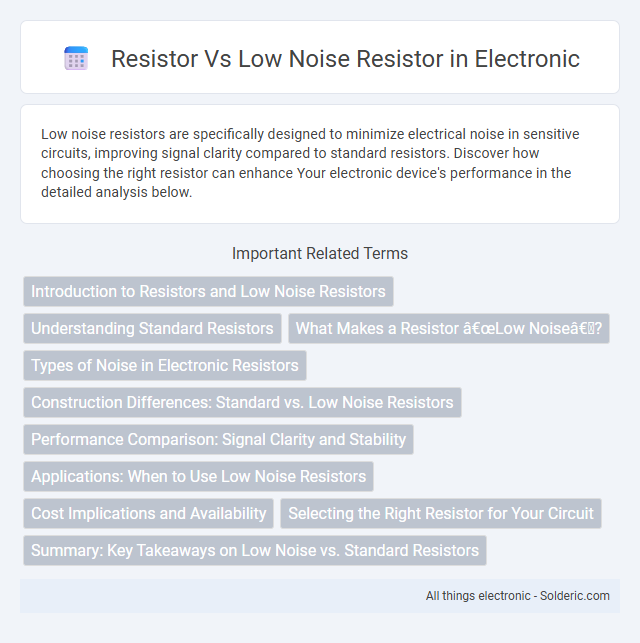Low noise resistors are specifically designed to minimize electrical noise in sensitive circuits, improving signal clarity compared to standard resistors. Discover how choosing the right resistor can enhance Your electronic device's performance in the detailed analysis below.
Comparison Table
| Feature | Resistor | Low Noise Resistor |
|---|---|---|
| Primary Purpose | Limit current and divide voltage | Minimize electrical noise in sensitive circuits |
| Noise Level | Higher noise generation (thermal and excess noise) | Significantly reduced noise, optimized for low noise |
| Materials | Carbon film, metal oxide, wirewound | Metal film or bulk metal foil, special alloys |
| Applications | General electronics, power supplies, signal circuits | Audio equipment, precision amplifiers, measurement instruments |
| Cost | Lower cost, widely available | Higher cost due to specialized manufacturing |
| Tolerance | Typical: +-1% to +-10% | Better tolerance, often +-0.1% to +-1% |
Introduction to Resistors and Low Noise Resistors
Resistors regulate electrical current by providing a precisely controlled amount of resistance, essential for circuit stability and performance. Low noise resistors minimize electrical noise generated during operation, making them ideal for sensitive audio, instrumentation, and measurement applications where signal integrity is critical. Choosing the right resistor affects Your circuit's accuracy and reliability, particularly in environments requiring minimal interference.
Understanding Standard Resistors
Standard resistors, typically made from carbon film or metal oxide, provide stable resistance values for general electronic circuits but may introduce higher noise levels due to material imperfections. Low noise resistors, often constructed from metal film or wire wound with precise manufacturing techniques, minimize excess noise especially in sensitive analog applications like audio and instrumentation. Understanding the differences in material composition and noise characteristics is crucial when selecting resistors to ensure optimal circuit performance and signal integrity.
What Makes a Resistor “Low Noise”?
A low noise resistor is specifically designed to minimize the electrical noise generated during current flow, achieved by using carefully selected resistor materials and construction techniques that reduce thermal and contact noise. Carbon composition resistors typically produce higher noise, while metal film or metal oxide resistors are preferred for their stable and low noise characteristics. Choosing a low noise resistor ensures higher accuracy and better signal integrity in sensitive applications, safeguarding the quality of your electronic circuits.
Types of Noise in Electronic Resistors
Electronic resistors exhibit various types of noise, mainly thermal noise, shot noise, and excess noise, which affect circuit performance. Low noise resistors are specifically designed to minimize excess noise generated by current flow through irregularities in the resistor material, making them ideal for sensitive audio and precision measurement applications. Your choice of resistor type significantly influences the signal-to-noise ratio and overall accuracy in electronic circuits.
Construction Differences: Standard vs. Low Noise Resistors
Standard resistors typically use carbon film or metal oxide construction with materials that can generate excess noise due to irregularities in their composition. Low noise resistors are often made with metal foil or metal film technology, providing a more uniform resistive element that significantly reduces electrical noise caused by current flow. The precise layering and superior material quality in low noise resistors minimize microphonic effects and thermal noise, making them ideal for sensitive electronic applications.
Performance Comparison: Signal Clarity and Stability
Low noise resistors offer superior signal clarity and stability compared to standard resistors by minimizing thermal and excess noise, essential for high-precision audio and measurement applications. These resistors maintain consistent resistance values over time and temperature fluctuations, ensuring reliable performance in sensitive circuits. Choosing low noise resistors enhances your system's accuracy and reduces signal distortion.
Applications: When to Use Low Noise Resistors
Low noise resistors are essential in precision audio equipment, instrumentation amplifiers, and sensitive signal processing circuits where minimizing signal distortion and interference is critical. Your choice to use a low noise resistor over a standard resistor improves performance in high-gain, low-level signal environments such as medical devices and high-frequency communication systems. Standard resistors suffice for general-purpose applications where noise is less impactful on circuit functionality.
Cost Implications and Availability
Low noise resistors typically cost more than standard resistors due to their specialized materials and manufacturing processes designed to minimize electrical noise, impacting budget considerations in sensitive electronic applications. Availability of low noise resistors can be limited, as they are often produced in smaller quantities and targeted toward niche markets, whereas standard resistors are widely available and offered by numerous suppliers globally. This disparity in cost and availability requires careful evaluation when designing circuits where noise performance is critical versus general-purpose uses.
Selecting the Right Resistor for Your Circuit
Selecting the right resistor involves balancing standard resistors' cost-effectiveness with low noise resistors' precision in sensitive applications. Low noise resistors minimize thermal and excess noise, making them essential for audio, instrumentation, and high-frequency circuits where signal integrity is critical. Consider resistance stability, noise specifications, and operating environment to ensure optimal performance and reliability in your electronic design.
Summary: Key Takeaways on Low Noise vs. Standard Resistors
Low noise resistors are specifically designed to minimize electrical noise, making them ideal for precision audio and signal processing applications, unlike standard resistors that may introduce unwanted noise. These resistors use specialized materials and construction techniques to reduce noise generated by current flow, improving overall circuit performance and accuracy. Choosing low noise resistors can enhance the quality and reliability of your sensitive electronic equipment.
resistor vs low noise resistor Infographic

 solderic.com
solderic.com